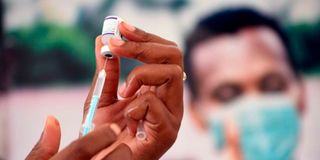On Covid-19, we are not off the hook yet

A health worker prepares to administer Covid 19 vaccination at Dagoretti Deputy County Commissioner's offices in Nairobi on February 3, 2022.
What you need to know:
- The virus is still with us and will likely find new ways for massive infection.
- There are many vulnerable spillover hosts for a massive evolution of the virus to occur.
The Covid-19 pandemic has had far-reaching impacts. It rolled back progress on nearly half of the 17 SDGs. Many people, mostly mothers and children, died due to the disruptions and delays in care.
Up to a decade of progress against HIV, tuberculosis (TB) and malaria were erased: The WHO says we’ve regressed 12 years in the fight to eradicate TB and forecasts a 20 per cent increase in mortality.
Some 12.6 million (33 per cent) HIV-positive patients were unable to access antiretroviral treatment. Critical anti-malaria activities were thwarted. Cancer research snarled as the focus moved to developing a vaccine.
Hospitals grappled with staffing, funding and operational challenges even as a “medical infodemic” threatened vaccination drives.
But not all transformative impacts were negative. Covid-19 showed the right product design can facilitate access; exposed the inefficiencies of the trickle-down global health model; brought data-driven global healthcare to life; and demonstrated how behavioural change is a public health “antibody”.
Not vaccinated
Even as we descend from the Omicron wave, we must temper our excitement with the realisation that we aren’t off the hook yet. The virus is still with us and will likely find new ways for massive infection. As it evolved from the original strain at the end of 2019 and progressed to the Alpha and Delta variants, it became more virulent and infectious.
While some falsely think it will evolve to a benign form, the pandemic has taught us that a virus has an extraordinary and unpredictable ability to adapt. The over 50 mutations in Omicron suggest infinite ways it can mutate and rearrange the 30,000 base pairs in its genome. We can’t even celebrate the possibility of it morphing into its relatively less-threatening seasonal common cold cousin.
There are many vulnerable spillover hosts for a massive evolution of the virus to occur. For example, millions of people are immunocompromised. Many more, according to the Ministry of Health, are not vaccinated. Such hosts create an ideal environment for infection to spread. That is a potential for deleterious versions of the virus that attach better and infect critical organs other than the lungs.
So far, simultaneous co-infections with two variants have been widely reported. The variants swap their RNAs and generate a hybrid, more infectious version. Despite being fortunate to receive effective vaccines in an uncharacteristically short time, and millions having so far been protected against severe disease, these vaccines were largely focused against the original strain of the Sars-CoV-2 virus.
We must, therefore, prepare for a worst-case scenario. That involves a better genomic sequencing and digital surveillance of the virus and bolstering protection with every public health arsenal at our disposal—including better air filtration, the expansion of the public WASH infrastructure and racing toward a variant-proof, pan-Covid-19 vaccine.
Mr Onyango, a life scientist, is a Global Fellow at Moving Worlds Institute. [email protected].





